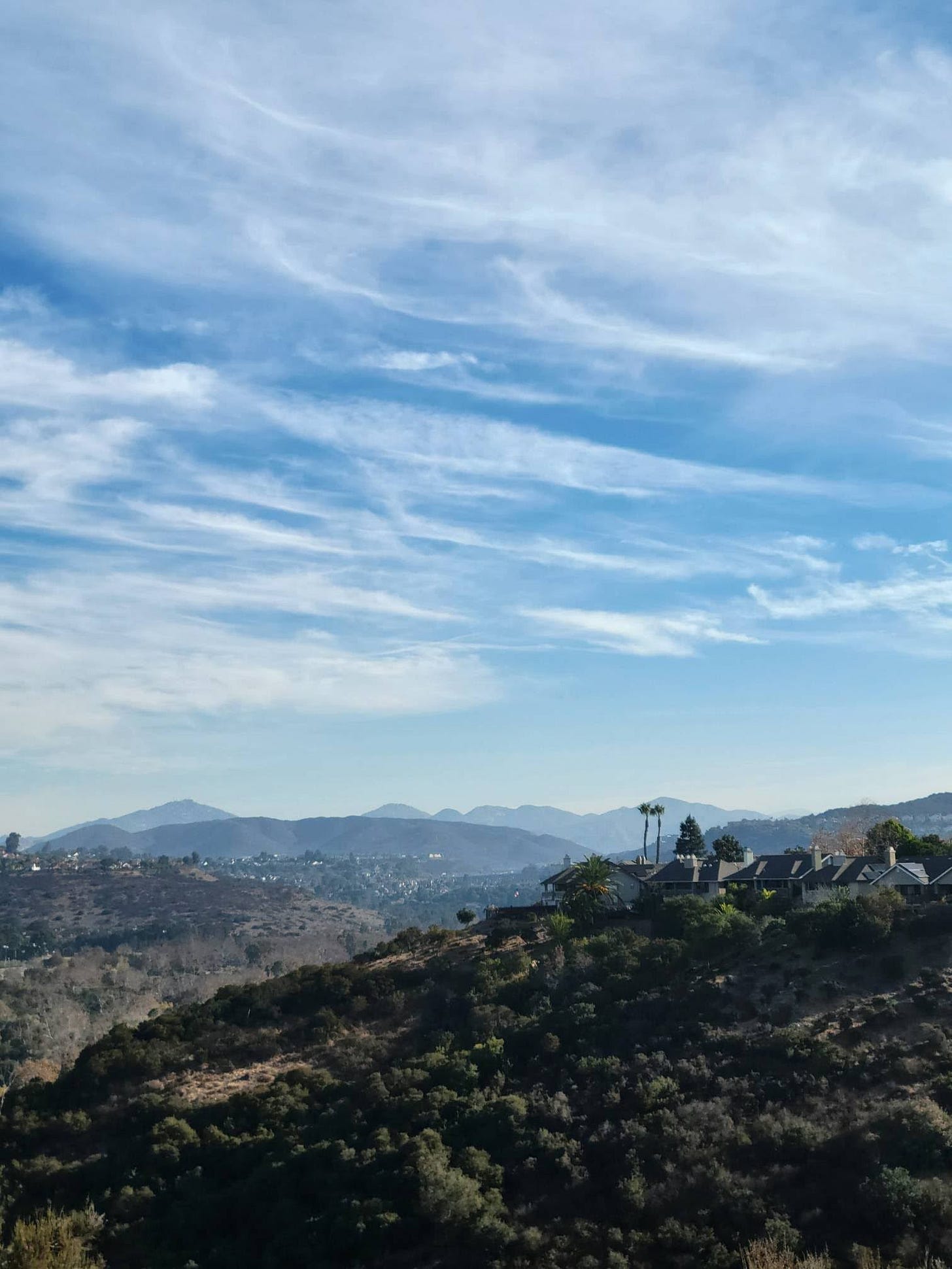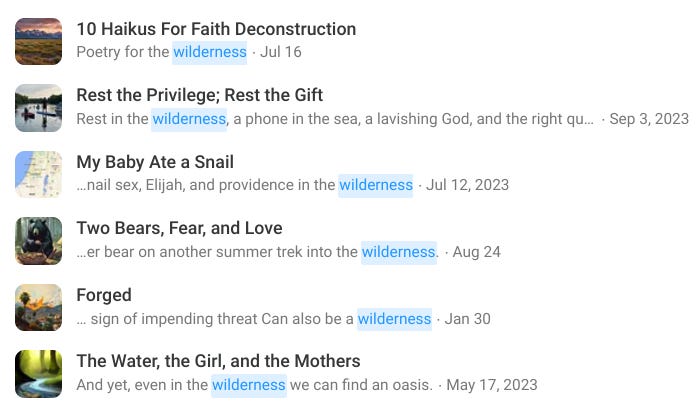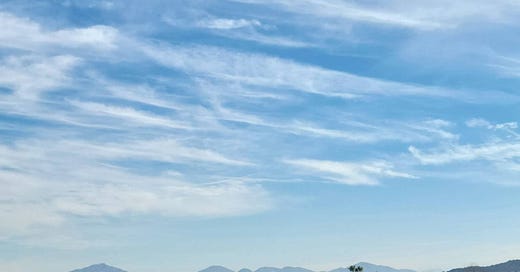At the end of each hike, I go to an overlook over the nearby valley to catch my breath. This time, though, as I looked at the spacious land before me, it felt like a mirror of my most compelling desires. I find myself longing to live in a spacious land.
In the last years there's always been just enough. Sometimes even more than enough, thank God! But, oh, I long for spacious land!

A Wilderness
I often find myself coming back to the story of the Hebrew people on the precipice of their Promised Land. These wandering refugees—likely numbering near a million people—were born into slavery and hard labor. Then, within the space of chaotic, if not traumatic, weeks or months, they became nomads.
This people group had to follow supernatural signs for their very survival, from passageways in giant bodies of water, to pillars of smoke and fire, and boulders gushing with water that satiated their thirst. The Hebrews carried with them both the generational trauma of oppression and a newfound freedom they had no experience with. Then, soon following, they were given a covenant and a set of expectations from a faceless, fearsome, and mighty God.
Welcome to the wilderness, folks.
Constriction
I’ve had a very different wilderness experience than the Hebrew people, but it has been the wilderness none-the-less. My wilderness hasn’t included nomadic-like freedom of movement. It hasn’t looked like wide-open desert nor has it been among rocky crags embedded into rugged mountains.
My wilderness has been the antonym of spacious.
Constricted is an excellent word to describe my life these five years. Constricted in hospitals, in lock-down, in health, in relationships, and in responsibilities. In church. In physical space. In opportunity and networks.
Some of this has been a result of general circumstance and some has been the result of harm. Some constriction has even been of my own doing, and not in a good way.
*It’s worth stating that constriction and the wilderness aren’t actually bad—they are typically necessary, but that is a totally different article*

Word of the year
I’ve written about it before here and I am going to state it again: I don’t believe a word for the year must be a mystical experience. Yet in this new year, the word “spaciousness” has felt supernatural. The chain of conversations I’ve had with trusted people and the scriptures I’ve read have drawn me deeper into the rabbit hole of “spacious”. Or maybe I should say freed me into the wonderland of the word, for spaciousness is anything but small and narrow.
When I first mentioned my longing for a spacious land, my husband asked me what it would look like for me to welcome spaciousness. That really became a challenge. I immediately began asking what spaciousness looks like and what it would require.
Spacious
At first I only thought of spacious as referring to width and physical space. But I’ve been surprised by the spaciousness of this word. (See what I did there?!)
What does spaciousness look like in my current physical space?
What does spaciousness look like in my community?
How can my heart become more spacious? What would that be like?
In what ways can my mind—both in mental load and in mental illness—become more spacious?
What does spaciousness look like in opportunities?
Can my health become spacious?
What do I actually hope for when I long to be “settled” in a spacious land?
How can I welcome spaciousness?
I have the feeling the meaning of this word will continue to expand throughout the year. That is, after all, the definition of spacious.
Promised Land
There is no way you can study the word “spacious” in the Bible without finding scriptures about the Promised Land. It might be one of it’s greatest themes, a thread running from Eden to Revelation, changing forms when Jesus enters the scene with his new covenant.
I have mixed feelings about the Promised Land in its most literal sense. Because, you know, genocide. And colonialism. It was probably one of my first big “deconstruction” moments back in my early twenties and I wrestled with God about it. Currently I’m rereading the Bible chronologically and I’m here again, deeply unsettled by this narrative.1
In the meantime, before I die and have a frank conversation with God about it, I am all about the metaphors and shadows of the Promised Land reflecting from the Old into the New Testament.
Would he really lead the way?
One thing that always stands out to me was that the Israelites didn’t have to wander in the desert a whole lifetime. They were given the opportunity to take their wide-open space and were just too afraid. It required stepping forward in faith in a way that couldn’t. It was too much for them to trust that their faceless God would keep his end of their covenant.
But if they did step forward—and later, when they did—God would continue to go before them. He’d pave the way through rivers, fortress walls, and supernaturally wipe out enemies. He’d even send hornets ahead of them to do the dirty work! (How had I never noticed that one before—Exodus 23:28?)
This group of ragtag former slaves-turned-refugees could inherit a land of freedom, plenty, and rest. But only if they took the risk to face their giants.
Precious safety
It used to be so hard for me to understand why the majority of people I knew had extensive barriers, walls, and protections around them. I am grateful for the privilege of safety, security and love that permeated my childhood. My nervous-system didn’t know trauma. And even later, I only experienced hurt and harm slowly through the following decades. At least, not until the last five years, when it came in tidal waves.
If you’ve followed the arc of my writing, you’ll see I’ve been on a road of physical healing and trauma-recovery. It’s been beyond hard, but I’m generally in a peaceful space right now. My body and mind don’t constantly think I am about to die or something terrible is about to happen. I’m starting to believe I am safe-ish, just shy of three years since the worst of it, and two since the last of it.
I can’t tell you how relieving it is to feel like danger might not be around every corner. Considering the Hebrew people from a trauma-informed perspective has caused me to engage with this story in a new way.
Like the Israelites, recently freed from a life trauma, I stand at the precipice overlooking a beautiful land. All of us who’ve been in the wilderness have this opportunity. We can settle there, cultivate it, call it our own, and begin to thrive. But to obtain it we have to risk our newfound safety.

The cost of spaciousness
I empathize greatly with this people group. I can only imagine the mental health struggles many of these people were dealing with! It was only two years out of Egypt! The Hebrews were still recovering! Yeeesh God, give them a break!
I know from experience that there never seems to be an end to stretching in this life. And how else do we get to spaciousness without stretching and risk? Or in their case, the risk of war, like being snatched back into slavery? Being killed in battle?
The cost we pay to step from the wilderness into the restful, fertile, and spacious land isn’t good ol’ hard work, like some of us might believe. It might not even be the risk of actual danger (even though they rightfully feared it—at least not if God continued to use hornets, their trumpets, and falling walls to clear the land).
The cost of spaciousness is the nerve-wrecking sense of free falling. The cost is trust—believing that God is big and good enough to catch us. It is a persevering faith, which deepens capacity and results in maturity.
Of course I love the dream of a spacious land. And I’m fully aware that the path to get there doesn’t have to be circling in my wilderness of constriction for forty more years. But I am also not sure I am brave enough to let down my protections and trust God with abandon.
A truce with the wilderness
Unlike the Israelites, I see the end of their story, a cautionary tale. To remain in their tentative truce with safety, the Hebrew people wasted their lives wandering in the wilderness. This generation never found a settled land where they could flourish.
Sure, no one likes being unsettled and barely surviving in an unwelcoming and chaotic place. But why shake up this tolerable way of living? The Israelites had been freed of something terrible; in comparison the wilderness wasn’t so bad. Even the familiar tyranny of Egypt started looking good.
It's amazing what we will settle for to avoid stirring up the feared storm called risk.
How many people do I know who’ve left their past to settle for an infinite wilderness? Past trauma, abusive churches, health scares, controlling religion, unhealthy relationships, shaky (if not downright frightening) politics, burnout, disappointment in fallen leaders—need I go on?
We know what we left behind. And then we get comfortable in the in-between, making a truce with the wilderness to protect us. And although the wilderness is designed to hold us for a season, beyond that it will stunt us.
What the wilderness cannot do for us
But the wilderness cannot protect us. Protection goes against it’s very nature! Must we be reminded that we aren’t created for the wilderness? It isn’t our end-point. We were designed to cultivate, root, grow, multiply, and flourish! And it is a myth that the wilderness provides—the Israelites had to depend on God for daily sustenance in the wilderness. So why not take just one more step of faith and enter into the spacious land?
I don’t judge this wandering people. But as I look at my own invitation to enter the spacious place, I feel scared. It is tempting to be content with the constriction of my wilderness, even as I long for more. Can I trust God to protect my heart, body, mind, family, strength, and soul as I step into its spaciousness? Even with threats that might lurk at the gate?
Wherever there is a God-given promise, although risk will be required, it will also be rewarded.
Maybe you have a different word than spaciousness drawing you forward in 2025 or maybe you want to adopt mine. But whatever that word is, I’m right there with you on the precipice. Let’s break our truce with the wilderness and choose to trust. Soon we will discover that it was well worth the risk so that we might flourish in the Promised Lands.
February Giveaway
Are you part of my book launch? We’re nearing the end! This month I am capitalizing in getting reviews! Over this sustainable book launch, each month for these six months I am doing a giveaway. How do you enter, you wonder?
⏩ Choose one item to do from my launch list! (The rest of the rules to this giveaway are found there, too.) Winner chosen at random at the beginning of March!
This month includes:
Fair trade coffee via Kicking Horse Coffee
2x fair trade chocolate via Seek Chocolate Shop
3x soap pack via Love Anyway Shop
Your choice of a copy of either Justice-Minded Kids or The Life Mapping Workbook
You can find past posts visiting authenticallyelisa.substack.com
Follow me on Instagram here @AuthenticallyElisa
See what’s new on my Patheos column: Flourishing Faith and Justice
If this post was helpful, please tap the heart 🖤 icon and leave a comment or reply to this email sharing something that stood out to you. Your engagement encourages me greatly. And when you engage here and/or share this, it helps these words reach others waiting for them. Thank you.
Sure, I studied all the reasoning and justifications, but I was never satisfied. Eventually, I just had to decide I had enough of a reason to still trust God’s goodness and to not throw my beliefs out. I’m sure when I’m dead God and I will have a great conversation about it.




